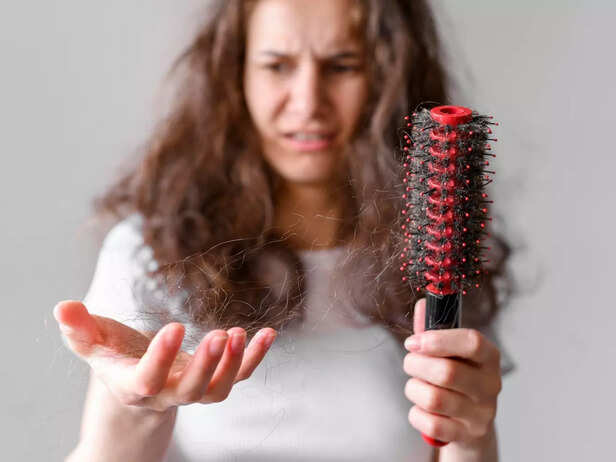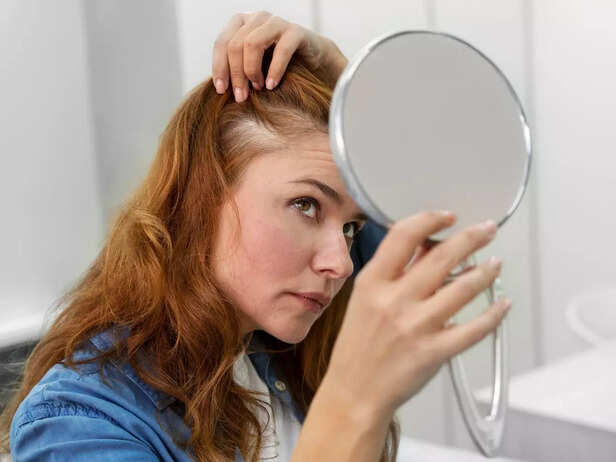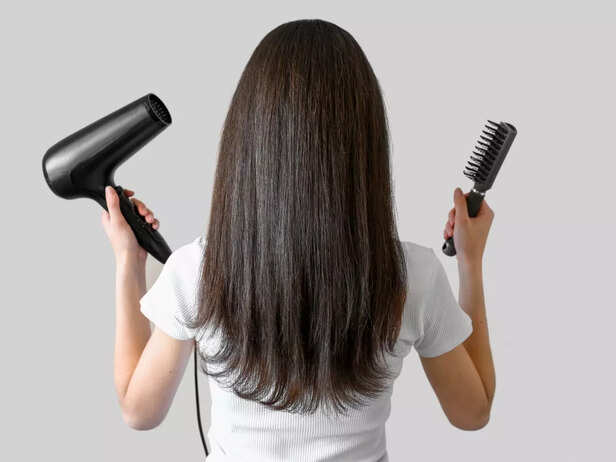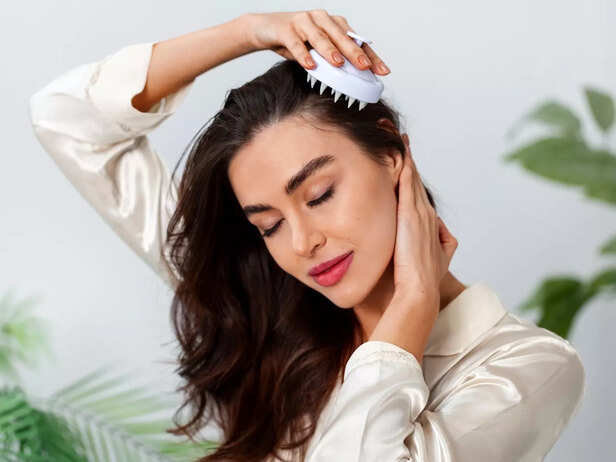Hair fall in Women: When Hormones and Stress Team Up Against You
Ritika | Oct 03, 2025, 20:02 IST
Hair fall
( Image credit : Freepik )
Hair fall in women is too easily dismissed as vanity, when it's so much more. Hormonal changes, daily stress, and lifestyle quietly influence the scalp and roots. Those shed strands are too often indications of imbalance in the body. Understanding the true causes, from hormones to stress, can lead to improved care and soothe the quiet anxiety so many women bear.
For women, hair is seldom merely hair. It is connected to confidence, to self, and to how one enters the world in the morning. So when strands remain on pillows, in shower drains, or between fingers, anxiety comes fast. Loved ones might assure it's normal, "seasonal," but the anxiety persists.
Though products on store shelves vow immediate repair, the truth usually occurs much deeper.
To know the "why" of hair loss means seeing bigger:

Hormones are among the strongest forces shaping women’s hair health. The female body moves through many hormonal waves, puberty, pregnancy, postpartum, and menopause. Each stage leaves its mark on hair.

Stress does not remain in the mind. It travels into the body, including the scalp. With chronic stress, cortisol, the stress hormone, increases. Excess cortisol can:
Usually, women see these weeks after stressful events like exams, job changes, illness, or emotional tension. The delay makes it misleading, the trigger and the hair loss don't match up right away.
Stress also triggers behaviors that make hair loss worse:
Calming the system matters as much as any oil or serum. Rest, gentle exercise, or simple breaks give the body space to reset.

Beyond hormones and stress, daily choices shape hair health too. Slowly accumulating causes make shedding impossible to ignore.

The solution to hair loss isn't with miracle oils or an individual magic pill. It begins with listening to the body.
Women's hair loss can begin quietly, but its effects are not quiet at all. They reach into self-esteem, confidence, and daily serenity. But the hairs that fall are seldom indiscriminate, those hairs bring with them tales of hormones on the move, stress bearing down, or lifestyle deficits to be addressed.
The significant change is in the perception of hair fall. Not as catastrophe, but as a sign. A warning that the body is requesting equilibrium, whether through rest, medical treatment, or more moderate living.
Ultimately, it is never anything about what's in the brush or on the ground. It's about what's beneath, the health of it, the tempo of life, and the silent equilibrium that hair always responds to.
Explore the latest trends and tips in Health & Fitness, Spiritual, Travel, Life Hacks, Trending, Fashion & Beauty, and Relationships at Times Life!
Though products on store shelves vow immediate repair, the truth usually occurs much deeper.
To know the "why" of hair loss means seeing bigger:
- how hormones change at various phases,
- how stress gradually erodes balance,
- and the way day-to-day decisions subtly determine what grows, or doesn't, on the head.
Hormonal Shifts and Their Impact

Women facing hair fall issues
( Image credit : Freepik )
Hormones are among the strongest forces shaping women’s hair health. The female body moves through many hormonal waves, puberty, pregnancy, postpartum, and menopause. Each stage leaves its mark on hair.
- Pregnancy: Many women enjoy thicker hair during this time. Higher estrogen levels keep strands in the growth phase longer.
- Postpartum: After childbirth, hormone levels dip. The hair that was resting begins to shed, sometimes in handfuls. This can feel alarming but is a natural phase.
- Thyroid issues: Both overactive and underactive thyroids can lead to hair thinning.
- PCOS: Polycystic Ovary Syndrome often brings hair troubles too, thin scalp hair paired with unwanted facial hair.
- mood swings,
- weight changes,
- fatigue,
- and skin problems.
Stress: The Silent Aggravator

Women looking in mirror
( Image credit : Freepik )
Stress does not remain in the mind. It travels into the body, including the scalp. With chronic stress, cortisol, the stress hormone, increases. Excess cortisol can:
- disrupt other hormones,
- lower nutrient uptake,
- and drive hair follicles into a premature resting phase.
Usually, women see these weeks after stressful events like exams, job changes, illness, or emotional tension. The delay makes it misleading, the trigger and the hair loss don't match up right away.
Stress also triggers behaviors that make hair loss worse:
- skipping meals,
- poor sleep,
- heavy dependence on caffeine or processed foods.
Calming the system matters as much as any oil or serum. Rest, gentle exercise, or simple breaks give the body space to reset.
Lifestyle and Everyday Triggers

Women with hair dryer and hair brush
( Image credit : Freepik )
Beyond hormones and stress, daily choices shape hair health too. Slowly accumulating causes make shedding impossible to ignore.
- Take hair treatments and styling. Constant coloring, chemical straightening, or overusing straighteners and curlers slowly weakens hair. It doesn’t snap right away, but strand by strand, the damage builds.
- Tight ponytails and buns don’t help either. They tug at the roots, and after months or years of it, hair starts to thin out more than usual.
- Nutrient deficiencies: Iron deficiency is the most common in women and is likely to lead to balding.
- Deficiency of vitamin D, zinc, or protein causes the issue too.
- Crash diets: Crash dieting drains the body, and hair is one of the first things to go.
- Insufficient sleep and hydration can impact the hair too, as it gets difficult for the body to heal without proper rest or when it is not hydrated for long.
- Water quality could also be behind hair damage. Hard water makes the hair strands brittle.
Finding Balance and Care

Women massaging her scalp
( Image credit : Freepik )
The solution to hair loss isn't with miracle oils or an individual magic pill. It begins with listening to the body.
- Consult health first: Doctor's consultations can detect thyroid issues, iron deficiency, or hormonal imbalance. Periodic tests are more useful than test after test of products.
- Then there is stress management. Yoga, meditation, exercising, or even a simple walk may prove beneficial. Journaling, listening to music, or spending time on hobbies, is another means of managing stress effectively. Some might need professional therapy too.
- Styling: When hair is stretched or tied tightly for too long or is regularly exposed to heat, it can be damaged. So, style with care. And be careful while choosing the shampoo, it shouldn't wash off the natural oils from the hair.
- Have a balanced diet that is rich in vegetables and proteins. Include nuts and seeds in your diet too. This will help rebuild the hair strength.
More Than Just Strands
The significant change is in the perception of hair fall. Not as catastrophe, but as a sign. A warning that the body is requesting equilibrium, whether through rest, medical treatment, or more moderate living.
Ultimately, it is never anything about what's in the brush or on the ground. It's about what's beneath, the health of it, the tempo of life, and the silent equilibrium that hair always responds to.
Explore the latest trends and tips in Health & Fitness, Spiritual, Travel, Life Hacks, Trending, Fashion & Beauty, and Relationships at Times Life!
